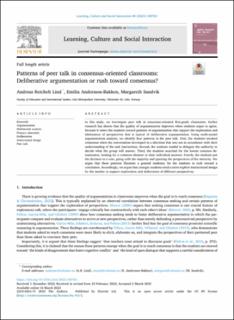Patterns of peer talk in consensus-oriented classrooms: Deliberative argumentation or rush toward consensus?
Peer reviewed, Journal article
Published version
Permanent lenke
https://hdl.handle.net/11250/3105514Utgivelsesdato
2023Metadata
Vis full innførselSamlinger
Originalversjon
10.1016/j.lcsi.2023.100703Sammendrag
In this study, we investigate peer talk in consensus-oriented first-grade classrooms. Earlier research has shown that the quality of argumentation improves when students argue to agree, because it steers the students toward patterns of argumentation that support the exploration and elaboration of perspectives that is typical of deliberative argumentation. Using multi-modal argumentation analysis, we identify four patterns in the peer talk. First, the students invoked consensus when the conversation developed in a direction that was not in accordance with their understanding of the task instructions. Second, the students tended to delegate the authority to decide what the group will answer. Third, the students searched for the lowest common denominator, looking for a common element in their individual answers. Fourth, the students put the decision to a vote, going with the majority and ignoring the perspectives of the minority. We argue that these patterns illustrate a general tendency for the students to rush toward a conclusion. Accordingly, we argue that younger students need a more explicit instructional design by the teacher to support exploration and elaboration of different perspectives.

